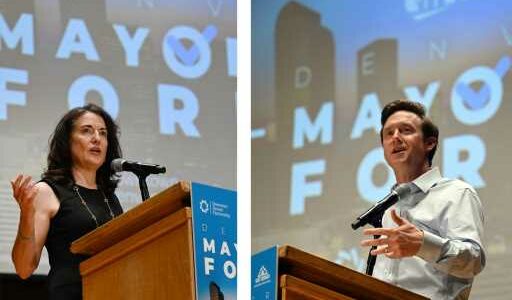
Denver voters turning in ballots faster in runoff phase of mayor’s race
Denver voters are turning in their runoff ballots at a rate that exceeds every mayoral election in the city since at least 2011.
In an election that will name either Kelly Brough or Mike Johnston Denver’s first new mayor in a dozen years and decide the direction of the next City Council with three seats still up for grabs, officials are being careful not to read too much into what those strong early returns might signal.
The priority on Tuesday night will be making sure all ballots turned in on Election Day are scanned as quickly as possible to let voters know they have been received, Denver Elections Division spokeswoman Lucille Wenegieme said. She expects counting itself to continue into Wednesday.
“We’re ahead of the last few elections so the turnout is looking great right now,” Wenegieme said Friday. “But we won’t know for sure if we’re going to see another spike in volume or if we’re going to land middle of the road, but we’re getting them earlier, which is what love.”
In the general election in April, 175,588 of the city’s more than 524,000 registered voters cast ballots, a turnout rate of roughly 33.5%. More than 104,000 of those ballots were returned on Election Day or the day before. Those later returns favored progressive mayoral candidate Lisa Calderón. She eventually got within 1.8% of Brough for second place and a spot in the runoff before conceding two days after Election Day.
In Denver’s 2019 municipal election, turnout fell from 39.6% in the first round of voting held in May to 35.1% in the June runoff.
Results were apparent early in the runoff that year. Mayor Michael Hancock declared victory less than two hours after polls closed.
With three-quarters of the city only having the mayor’s race on their runoff ballots, former Denver Elections Division official Alton Dillard said he expects it to be clear who won before people go to bed Tuesday night.
“There is a difference between counting and the final margin. But I don’t see this as being a true nail-biter,” said Dillard, who retired from the elections division last year and now runs his own consulting business. “I could be totally wrong because there really hasn’t been any polling but I think we’ll have a pretty good idea (who won) by the final report Tuesday night.”
The elections division typically posts its last batch of results at 11:30 p.m. on election night before sending judges home for some rest and resuming the count the next day.
A poll released in mid-April showed the mayoral runoff as neck and neck. Johnston, the former state senator, school principal and, most recently, CEO of one of the state’s most powerful philanthropies, netted 38.9% support among respondents. Brough, the former chief of staff to then-Mayor John Hickenlooper and the president and CEO of the Denver Metro Chamber of Commerce for 12 years, was favored by 34.1%. That left 27% of those polled in the undecided category. The poll’s margin of error was 4.8%, putting the candidates in a statistical dead heat.
Reading the tea leaves on campaign behavior, Dillard surmises that the Brough and Johnston camps still see the race as very much up for grabs.
Advancing Denver, an outside spending group supporting Johnston, spent $451,200 on May 30 on a media buy. A Better Denver, the independent expenditure committee working to get Brough elected, spent $169,355 on a media buy on May 25.
“Looking at it from just the political lens, the fact that there are new ads going up heading into the last weekend shows the campaigns are also aware that a lot of people in Denver will probably vote on Election Day,” Dillard said.
Through the end of April, Brough had out-fundraised Johnston $1.84 million to $1.7 million when including matching taxpayer dollars from the Fair Elections Fund. But the independent expenditure committee backing Johnston had outspent Brough’s by more than $3.3 million as of Friday.
The two mayoral hopefuls have policy differences, particularly around unsheltered homelessness. Johnston has vowed to solve that growing problem in Denver via the creation of “micro-communities” of converted hotel rooms and tiny homes. Brough aims to address it by providing sanctioned camping areas. She would use arrests as a last resort to enforce the city’s camping ban, a step Johnston said he would not take.
But the two are largely viewed as similar, centrist candidates by opponents who align to their left, raising the prospect that later turnout in the race will be depressed or that a significant number of voters will turn in ballots without making a choice in the mayor’s race, known as undervoting. Tiffany Caudill, a progressive candidate who lost her race for the District 2 council seat claimed by incumbent Kevin Flynn, announced on Twitter last month that she intended to return her ballot without filling in a bubble for either candidate.
Stay up-to-date with Colorado Politics by signing up for our weekly newsletter, The Spot.
Source: Read Full Article